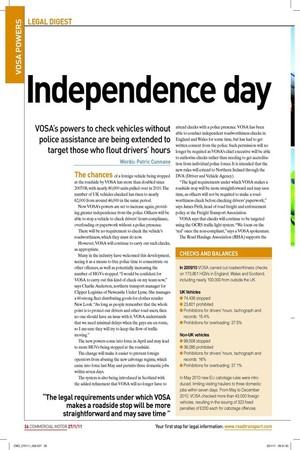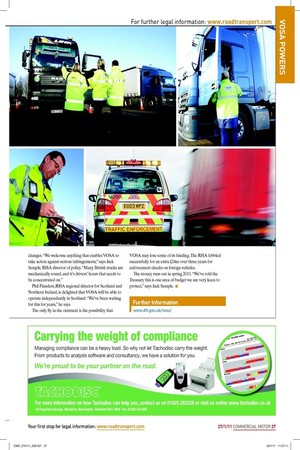Independence day
Page 22

Page 23

If you've noticed an error in this article please click here to report it so we can fix it.
VOSA’s powers to check vehicles without police assistance are being extended to target those who flout drivers’ hours
Words: Patric Cunnane The chances of a foreign vehicle being stopped at the roadside by VOSA has more than doubled since 2007/08, with nearly 80,000 units pulled over in 2010. The number of UK vehicles checked has risen to nearly 62,000 from around 46,000 in the same period.
Now VOSA’s powers are set to increase again, providing greater independence from the police. Oficers will be able to stop a vehicle to check drivers’ hours compliance, overloading or paperwork without a police presence.
There will be no requirement to check the vehicle’s roadworthiness, which they must do now.
However, VOSA will continue to carry out such checks, as appropriate.
Many in the industry have welcomed this development, seeing it as a means to free police time to concentrate on other offences, as well as potentially increasing the number of HGVs stopped. “I would be conident for VOSA to carry out this kind of check on my team now,” says Charlie Anderson, northern transport manager for Clipper Logistics of Newcastle Under Lyme. She manages a 60-strong leet distributing goods for clothes retailer New Look. “As long as people remember that the whole point is to protect our drivers and other road users, then no one should have an issue with it. VOSA understands that we need minimal delays when the guys are en route, so I am sure they will try to keep the low of trafic moving.” The new powers come into force in April and may lead to more HGVs being stopped at the roadside.
The change will make it easier to prevent foreign operators from abusing the new cabotage regime, which came into force last May and permits three domestic jobs within seven days.
The system is also being introduced in Scotland with the added reinement that VOSA will no longer have to attend checks with a police presence. VOSA has been able to conduct independent roadworthiness checks in England and Wales for some time, but has had to get written consent from the police. Such permission will no longer be required as VOSA’s chief executive will be able to authorise checks rather than needing to get accreditation from individual police forces. It is intended that the new rules will extend to Northern Ireland through the DVA (Driver and Vehicle Agency).
“The legal requirements under which VOSA makes a roadside stop will be more straightforward and may save time, as oficers will not be required to make a roadworthiness check before checking drivers’ paperwork,” says James Firth, head of road freight and enforcement policy at the Freight Transport Association.
VOSA says that checks will continue to be targeted using the OCRS trafic light system. “We focus on the ‘red’ ones: the non-compliant,” says a VOSA spokesman.
The Road Haulage Association (RHA) supports the changes. “We welcome anything that enables VOSA to take action against serious infringements,” says Jack Semple, RHA director of policy. “Many British trucks are mechanically sound, and it’s drivers’ hours that needs to be concentrated on.” Phil Flanders, RHA regional director for Scotland and Northern Ireland, is delighted that VOSA will be able to operate independently in Scotland. “We’ve been waiting for this for years,” he says.
The only ly in the ointment is the possibility that VOSA may lose some of its funding. The RHA lobbied successfully for an extra £24m over three years for enforcement checks on foreign vehicles.
The money runs out in spring 2011. “We’ve told the Treasury this is one area of budget we are very keen to protect,” says Jack Semple. ■














































